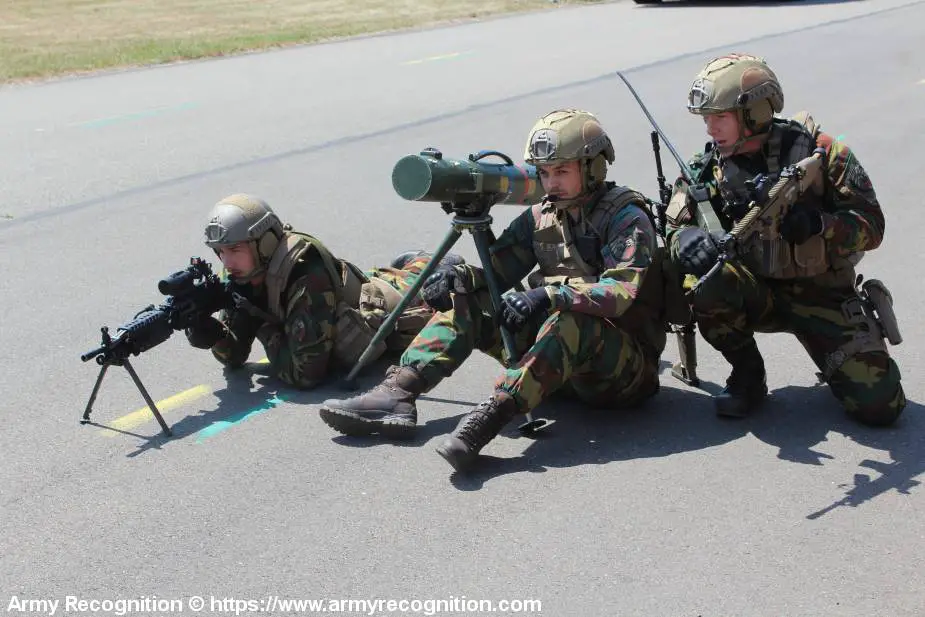Breaking news
Vilnius Summit 2023: NATO Allies and Belgium Reinforcing Defense Capabilities.
The summit, which will take place at Vilnius today and tomorrow July 11 and 12 2023, aims to strengthen collective security and defense among member countries by implementing concrete measures to bring Ukraine closer to NATO, enhance deterrence and defense capabilities, and promote interoperability with other European nations. Additionally, the focus on increasing defense investments, with the objective of allocating at least 2% of GDP to the sector, is also highly relevant for Belgium as it seeks to reinforce its defense capabilities and address emerging security challenges. This initiative aligns with the commitment made by Alexander De Croo at the Madrid summit a year ago.
Follow Army Recognition on Google News at this link

Belgian troops have received new modern equipment, such as new helmets, rifles, and missile launchers. (Picture source Army Recognition )
The summit aims to strengthen collective security and defense among member countries by implementing concrete measures to bring Ukraine closer to NATO, enhance deterrence and defense capabilities, and promote interoperability with other European nations. Additionally, the focus on increasing defense investments, with the objective of allocating at least 2% of GDP to the sector, is also highly relevant for Belgium, as it seeks to reinforce its defense capabilities and address emerging security challenges.
For several years now, Belgium has embarked on a modernization process of its armed forces to address contemporary security challenges, further amplified by the international context shaped by the war in Ukraine. Since 2014, when NATO set the goal of allocating at least 2% of GDP to defense spending, Belgium has endeavored to meet this standard.
The situation in Ukraine has served as a wake-up call for many European countries, including Belgium, highlighting the importance of strengthening their military capabilities in the face of an increasingly complex and uncertain security environment. Geopolitical tensions and ongoing conflicts have underscored the need for NATO member states to allocate adequate resources to defense and security.
In 2016, Belgium adopted its Strategic Vision for Defense, which outlines military investments of 9.2 billion euros until 2030. However, this commitment falls short of reaching the 2% of GDP required by NATO. To address this challenge, in January 2021, Minister of Defense Ludivine Dedonder established a Strategic Committee tasked with updating the 2016 Strategic Vision and proposing a new military programming law for the years 2030-2040.
With that purpose in mind, the CaMo (Motorized Capability) program was launched by Belgium in 2015. It is a long-term project aimed at modernizing and strengthening the capabilities of Belgium's land component within NATO. Since its inception, the CaMo program has made progress in the development and acquisition of new capabilities for Belgium's motorized brigade.
The Camo program includes the acquisition of 442 armored vehicles, including 382 Griffons and 60 Jaguars, from France. These new vehicles, equipped with advanced technologies, will provide the Belgian army with increased operational capabilities. They will also improve interoperability between Belgian and French forces, facilitating closer cooperation and joint operations.
In June 2022, the Belgian government proposed an increase in defense efforts to strengthen its military capabilities. The Minister of Defense aims to allocate 1.6% of GDP to defense spending by 2030, which amounts to an additional 3 billion euros compared to the 2016 Strategic Vision. However, political debates have arisen regarding the magnitude of investments and their implications for other social and environmental areas.
In the face of security challenges and the urgency to strengthen defense capabilities, during the NATO summit in Madrid in July 2022, Belgian Prime Minister Alexander De Croo announced Belgium's commitment to allocate at least 2% of GDP to defense spending by 2035. This decision aims to comply with NATO requirements and ensure the country's national security.
In June 2023, the Belgian government presented a detailed defense budget plan, which outlines a gradual increase in military expenditures. The objective is to reach 1.54% of GDP by 2030 and continue to raise defense spending until reaching 2% of GDP by 2035. These investments aim to modernize the Belgian armed forces and enhance their operational capabilities.
Despite its efforts, Belgium is among the five NATO countries that do not meet the recommended military spending standards. Despite the actions taken by many countries, including Poland (3,90), the United States (3,90%), Greece (3,01%), Estonia (2,73), Belgium is considered to be lagging behind in meeting these commitments with its 1,13%. Belgium, on the other hand, needs to make additional efforts to reach the recommended levels of military expenditure. Furthermore, it was announced once again at the today's opening of the new NATO summit in Vilnius that a minimum effort of 2% of GDP, rather than a maximum, would now be required by member states.


























